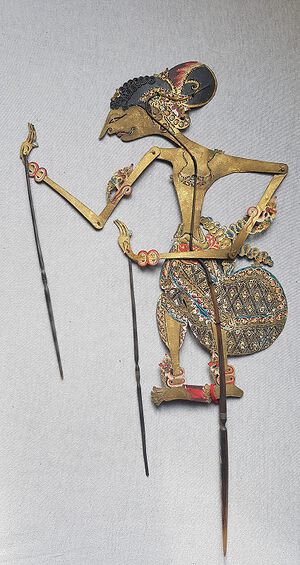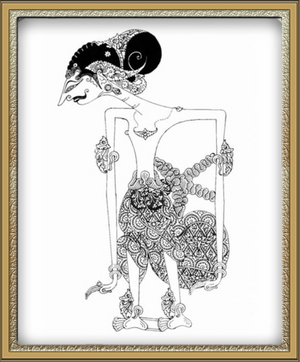Puntadewa - (Wayang Kulit): Difference between revisions
(Created page with "My name is Manuel and I am studying Directing and Neuroscience at St Levan / Great Britain.<br><br>Also visit my web-site Kometa web casino ([https://game-ss.ru/ game-ss.ru]) ") |
(Created page with "My name is Manuel and I am studying Directing and Neuroscience at St Levan / Great Britain.<br><br>Also visit my web-site Kometa web casino ([https://game-ss.ru/ game-ss.ru]) ") |
||
| Line 9: | Line 9: | ||
|Collection=Private collection | |Collection=Private collection | ||
}} | }} | ||
In the enchanting realm of Wayang Kulit, where shadows dance and ancient tales unfold, Puntadewa stands tall as a beacon of righteousness. More than just the eldest son of the Pandavas, he embodies the very essence of Dharma, the cosmic law of justice and morality. This article delves into the compelling narrative of Puntadewa, exploring his unwavering devotion to principle, his tragic struggles, and the enduring lessons embedded within his journey. | == Puntadewa - () - Mahabharata == | ||
In the enchanting realm of Wayang Kulit, where shadows dance and ancient tales unfold, Puntadewa stands tall as a beacon of righteousness. More than just the eldest son of the Pandavas, he embodies the very essence of Dharma, the cosmic law of justice and morality. This article delves into the compelling narrative of Puntadewa, exploring his unwavering devotion to principle, his tragic struggles, and the enduring lessons embedded within his journey.<p> | |||
'''Born for Greatness'''<br> | |||
Born for Greatness | Often depicted with a noble demeanor and flowing white attire, Puntadewa's lineage itself signifies his destiny. Born under the celestial influence of Yama, the god of justice, he is destined to uphold righteousness throughout his life. His journey is intricately woven with challenges that test his commitment to Dharma, each one shaping him into a leader of unparalleled integrity and wisdom.<p> | ||
Often depicted with a noble demeanor and flowing white attire, Puntadewa's lineage itself signifies his destiny. Born under the celestial influence of Yama, the god of justice, he is destined to uphold righteousness throughout his life. His journey is intricately woven with challenges that test his commitment to Dharma, each one shaping him into a leader of unparalleled integrity and wisdom. | |||
The Burden of Righteousness | '''The Burden of Righteousness'''<br> | ||
Puntadewa faces trials unlike any other. He is renowned for his truthfulness and fairness, even in the face of deceit and manipulation. The infamous game of dice symbolizes his greatest struggle, forced to wager his kingdom and brothers due to his adherence to truth. Yet, even in his downfall, he maintains his dignity and unwavering faith in Dharma, offering a powerful lesson in staying true to one's values even in the face of adversity. | Puntadewa faces trials unlike any other. He is renowned for his truthfulness and fairness, even in the face of deceit and manipulation. The infamous game of dice symbolizes his greatest struggle, forced to wager his kingdom and brothers due to his adherence to truth. Yet, even in his downfall, he maintains his dignity and unwavering faith in Dharma, offering a powerful lesson in staying true to one's values even in the face of adversity.<p> | ||
The Power of Leadership | |||
Despite his trials, Puntadewa remains the guiding light for his brothers. He leads them through exile, injustice, and ultimately, victory, inspiring them through his unwavering commitment to their shared goals. His leadership extends beyond his kin, earning the respect and trust of allies and even his adversaries. Through his words and actions, he demonstrates the true meaning of leadership: serving justice, upholding morals, and inspiring others to do the same. | '''The Power of Leadership'''<br> | ||
Symbolism and Complexity | Despite his trials, Puntadewa remains the guiding light for his brothers. He leads them through exile, injustice, and ultimately, victory, inspiring them through his unwavering commitment to their shared goals. His leadership extends beyond his kin, earning the respect and trust of allies and even his adversaries. Through his words and actions, he demonstrates the true meaning of leadership: serving justice, upholding morals, and inspiring others to do the same.<p> | ||
Puntadewa's white attire signifies purity and righteousness, while his association with the color blue represents wisdom and truth. He holds the Yudhisthira dagger, symbolizing his power and responsibility. However, Puntadewa is not without flaws. His adherence to his ideals can sometimes lead to naivety or even harshness. This complexity makes him a relatable and thought-provoking character, reminding us that even the most righteous struggle with navigating the gray areas of life. | |||
Beyond the Shadow Stage | '''Symbolism and Complexity'''<br> | ||
Puntadewa's white attire signifies purity and righteousness, while his association with the color blue represents wisdom and truth. He holds the Yudhisthira dagger, symbolizing his power and responsibility. However, Puntadewa is not without flaws. His adherence to his ideals can sometimes lead to naivety or even harshness. This complexity makes him a relatable and thought-provoking character, reminding us that even the most righteous struggle with navigating the gray areas of life.<p> | |||
'''Beyond the Shadow Stage'''<br> | |||
The influence of Puntadewa extends far beyond the Wayang stage. He is a revered figure in Indonesian culture, inspiring literature, art, and even contemporary discussions on ethics and leadership. His enduring popularity highlights the universal yearning for justice and the enduring relevance of his values in modern life. | The influence of Puntadewa extends far beyond the Wayang stage. He is a revered figure in Indonesian culture, inspiring literature, art, and even contemporary discussions on ethics and leadership. His enduring popularity highlights the universal yearning for justice and the enduring relevance of his values in modern life. | ||
[[Category:Wayang Kulit Puppets]] | |||
Revision as of 16:59, 29 April 2024
| Title | Puntadewa - () - Mahabharata |
|---|---|
| Other names | ... |
| Size | 45 cm |
| Personal data | ... |
| Appearance | ... |
| Collection | Private collection |
Puntadewa - () - Mahabharata
In the enchanting realm of Wayang Kulit, where shadows dance and ancient tales unfold, Puntadewa stands tall as a beacon of righteousness. More than just the eldest son of the Pandavas, he embodies the very essence of Dharma, the cosmic law of justice and morality. This article delves into the compelling narrative of Puntadewa, exploring his unwavering devotion to principle, his tragic struggles, and the enduring lessons embedded within his journey.
Born for Greatness
Often depicted with a noble demeanor and flowing white attire, Puntadewa's lineage itself signifies his destiny. Born under the celestial influence of Yama, the god of justice, he is destined to uphold righteousness throughout his life. His journey is intricately woven with challenges that test his commitment to Dharma, each one shaping him into a leader of unparalleled integrity and wisdom.
The Burden of Righteousness
Puntadewa faces trials unlike any other. He is renowned for his truthfulness and fairness, even in the face of deceit and manipulation. The infamous game of dice symbolizes his greatest struggle, forced to wager his kingdom and brothers due to his adherence to truth. Yet, even in his downfall, he maintains his dignity and unwavering faith in Dharma, offering a powerful lesson in staying true to one's values even in the face of adversity.
The Power of Leadership
Despite his trials, Puntadewa remains the guiding light for his brothers. He leads them through exile, injustice, and ultimately, victory, inspiring them through his unwavering commitment to their shared goals. His leadership extends beyond his kin, earning the respect and trust of allies and even his adversaries. Through his words and actions, he demonstrates the true meaning of leadership: serving justice, upholding morals, and inspiring others to do the same.
Symbolism and Complexity
Puntadewa's white attire signifies purity and righteousness, while his association with the color blue represents wisdom and truth. He holds the Yudhisthira dagger, symbolizing his power and responsibility. However, Puntadewa is not without flaws. His adherence to his ideals can sometimes lead to naivety or even harshness. This complexity makes him a relatable and thought-provoking character, reminding us that even the most righteous struggle with navigating the gray areas of life.
Beyond the Shadow Stage
The influence of Puntadewa extends far beyond the Wayang stage. He is a revered figure in Indonesian culture, inspiring literature, art, and even contemporary discussions on ethics and leadership. His enduring popularity highlights the universal yearning for justice and the enduring relevance of his values in modern life.


